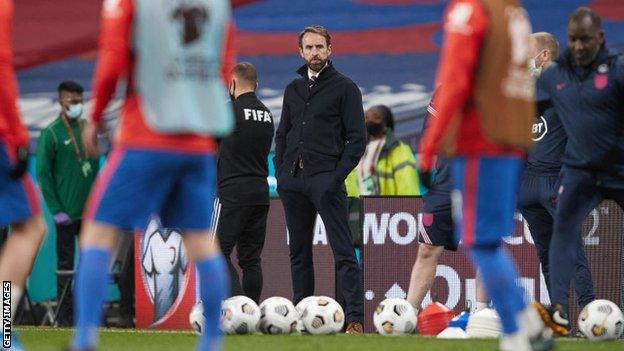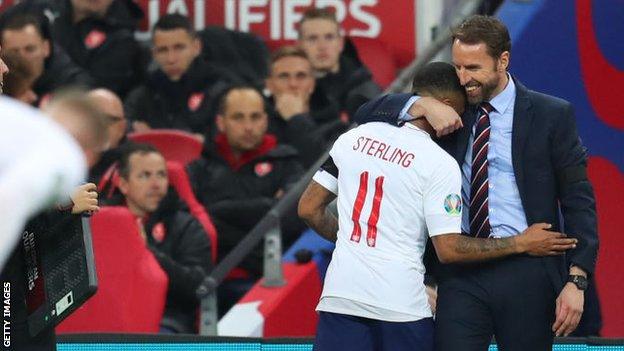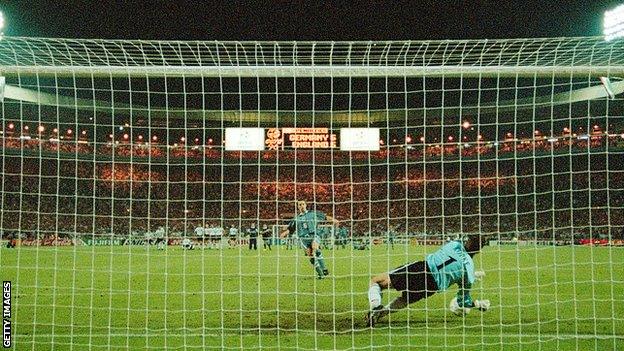Euro 2020: How Gareth Southgate restored faith in England’s national team
- Published

Southgate earned 57 England caps as a player and is nearing that many games as national team boss
Euro 2020 |
|---|
Dates: 11 June-11 July. Venues: Amsterdam, Baku, Bucharest, Budapest, Copenhagen, Glasgow, London, Munich, Rome, Seville, St Petersburg. Coverage: Live on BBC TV, BBC Radio 5 Live, iPlayer and the BBC Sport website and app. Click here for more details |
"One of the main factors I got with Gareth Southgate," 42-cap striker Danny Welbeck says of the England manager, "was he likes to make sure there's a really good culture within the group".
It is a term that is referenced with increasing regularity within the sporting world, one dismissed by detractors as a form of empty business jargon.
But not only does Southgate believe in the importance of implementing a strong working culture, it is the central tenet of his management style.
Whenever England qualify for a major tournament, frenzied expectation begins to mount. And as the Three Lions prepare for Euro 2020 this month, the customary optimism has rarely been more justified.
With arguably their strongest side in a decade and off the back of a semi-final run at the 2018 World Cup, England rank high among the pre-tournament favourites.
England sides of the past have crumbled under the weight of such expectation, and it is through his fostering of a culture of inclusion, cohesion and preparedness that Southgate aims to ease the pressure on his players.
"You're playing for your country, there are a lot of people watching you, but he wanted to take that pressure away from the group," Welbeck remembers of his England call-up in 2017, his first following Southgate's appointment the previous year. "He created an environment for everybody to be relaxed and express themselves on the pitch.
"The place that we're staying, he'll try to get the togetherness of the group. There are little games rooms that everyone can go to.
"There'll be meetings, but in the meetings we'll engage with each other. You'll learn a lot about your team-mates, not just on the pitch but also off the pitch as well. That makes a huge difference.
"Playing for different clubs, you might know the players, but you don't know them know them. He wants to get you to be involved with each other."
'If I could have picked five or six right-backs I would have done' - Southgate
Southgate stepped up from his role as under-21s boss to become England's caretaker manager in September 2016 after Sam Allardyce resigned amid a corruption scandal.
Charged with overseeing the next four fixtures before a permanent appointment would be made, Southgate had just days to assemble and prepare his squad for a 2018 World Cup qualifier against Malta at Wembley.
Initially, he changed as little as possible. He trusted the experienced support staff already in place and the players, some of who he had worked with in his under-21s capacity, appreciated the continuity he offered.
Southgate professed no designs on the permanent manager's position at first, training his focus solely on the four matches he had been tasked with overseeing. He recognised how England's shocking exit from Euro 2016 at the hands of Iceland, quickly followed by the Allardyce debacle, had bred apathy for the national team.
At the time, he felt there would be little public appetite for his appointment instead of a more established name.
But as his two-month temporary stint progressed and brought positive results - wins over Malta and Scotland and draws with Slovenia and Spain - he felt the faith of the fans return. His belief in his suitability for the role grew.
He realised he would often advise people to have no regrets in life, and that it would be hypocritical to ignore his own advice. The FA confirmed Southgate's appointment as England's permanent manager on 30 November 2016.
From the beginning, reshaping the culture within the squad and his staff was a priority.
In his four and a half years in the role, Southgate has drawn influences and inspiration on matters of team-building, sustainable success and man-management best practices from a wide range of sources.
He speaks regularly with England rugby union coach Eddie Jones and his predecessor Stuart Lancaster, former British Cycling performance director Dave Brailsford, and has mined England cricket captain Eoin Morgan for insight into how his team operates.
He attends leadership conferences, listens to podcasts on that subject and met with NFL coaches after attending the Super Bowl in 2018. He has even studied Nike, the national team's kit manufacturer, in an effort to glean any transferable tips on how their slick operation is run.
One of the key changes Southgate has implemented is the creation of a leadership group of senior players. He made Harry Kane England captain in 2018, but having seen the pressure the armband heaped on its previous occupant, Wayne Rooney, as the de facto figurehead and spokesperson for the team, the manager was keen to ensure that burden could be carried by a number of his most experienced players.
Instead of lumbering his star striker with the lion's share of media duties, they are now divided among this senior cohort, with who he will also consult on a variety of matters.
He did exactly that last week when discussing how to respond to some fans booing when the players took the knee in the friendly against Austria.
"I wanted to hear from the more senior players in the group first and foremost," he told BBC Radio 5 Live. "I met with a slightly smaller group because I think it's easier for people to talk and open up in that way. My role is to represent the feelings and thoughts of the whole group and it was important to hear their view."

Southgate led England to the semi-finals of the 2018 World Cup in Russia
Southgate's tenure as England manager has seen challenges to the harmony he has fostered, both from external and internal forces.
In March 2019, Danny Rose was the target of racist abuse from the stands as England played Montenegro in a Euro 2020 qualifier in Podgorica. From their position in the stadium, though, Southgate, his coaches and the FA staff present were unable to hear the torrent aimed at the Tottenham player.
It was only when Raheem Sterling scored and celebrated by cupping his ear to the crowd that they suspected something was not right, and Southgate was not made aware of the racist abuse until after the game.
In the final minutes of the match, Rose picked up a yellow card. Southgate admonished the defender for what he felt was a rash and unnecessary booking.
The manager is described as having been "mortified" when, soon after, he learned of the abuse Rose had suffered. He understood the frustration and anger that must have been building in the full-back at the time of his booking. Southgate immediately sought out Rose and apologised.
After the game, Southgate was disappointed with himself for having been unaware of the abuse to which his players had been subjected and with the fact more robust protocols were not in place to bring it to his attention sooner.
He led the implementation of a new process, ensuring any reports of abuse were fed into him more quickly, and that players were emboldened to speak up right away if a similar incident were to occur again.
In consultation with the FA's sports psychology team, new protocols were drawn up and a support network put in place for tackling such abuse, and everyone was better prepared when, sadly, it happened again against Bulgaria seven months later.
Because Southgate spoke so well on the issue afterwards, calmly and articulately condemning the fans' behaviour and supporting his players to the fullest, he now often receives requests for interviews or to take part in documentaries around the subject of racism in sport.
But he always politely declines, feeling that, as a white man in his 50s, there are many people in the game better placed to speak on the matter with the authority of first-hand experience.
Before a Nations League game against Iceland in Reykjavik in September last year, Phil Foden and Mason Greenwood were found to have breached Covid restrictions by inviting women to their hotel room.
The young duo's indiscretion represented the most challenging disciplinary issue Southgate had faced as England manager, and some reports shortly after the event claimed he stormed up to the pair's room and issued an angry dressing-down.
But, in reality, Southgate dealt with the situation in typically measured fashion. When a disciplinary matter arises, he seeks the counsel of his colleagues, gathering information about what has transpired before selecting an appropriate response. In this instance, a contravention of Covid protocols dictated that the players had to be removed from the squad.
Southgate was unequivocal and stern in reprimanding them, but he is empathetic and clear-sighted enough to realise that young people make mistakes. Once the incident was dealt with, a line was drawn under it and no lingering resentment was harboured.
"I don't really understand how players could have felt that was acceptable," Southgate said at the time. "That is a puzzle to me at the moment. We talked about a Covid breach. Initially that was what we needed to take control of. We had to act quickly.
"Trust needs to be rebuilt and that takes time. There has to be a consequence to what happened and then we've got to try to help them rebuild. Young people err more often than older people do. But that doesn't mean you can hold that against them forever. With the spotlight on them and what their families will be having to deal with, that's an incredible ordeal for young people."
Just as he has exuded an air of calm decisiveness in moments of strife off the pitch, so too has Southgate met moments of tension and high pressure on the pitch with tranquil competence. None more so than in the last 16 of the 2018 World Cup, when England's showdown with Colombia went to penalties.

Southgate missed a crucial penalty as England lost in a shootout to Germany in the semi-finals of Euro 96 on home soil
England had only won one of their previous seven shootouts at major tournaments - Southgate himself famously missed against Germany in their semi-final defeat at Euro 96 - and for years a collective sense of dread has swept over the nation whenever a high-stakes game was to be decided from 12 yards.
But, confident in his preparation and with unshakable faith in his squad, Southgate expressed a calmness that transmitted to his players, who scored a 4-3 spot-kicks win over Colombia.
"He remains level-headed," says Welbeck, an England squad member at the 2018 World Cup. "He's got that presence where he wants you to feel he is also relaxed in a situation, no matter how much pressure is on it. He's been through these experiences and has come through them, so he can put the behaviours he uses in those situations on to the players.
"That radiates to every single one of us. In football, anything can happen at any given moment, so it's important in those situations to keep your head and remain focused.
"He was very prepared going into the Colombia game. We all knew what sort of side we wanted to be, how we wanted to play against the teams we were coming up against. We had been practising penalties. Not just the technical side of taking a penalty but the mental side.
"It's very difficult to replicate the pressure in training. We'd take them at the end of training sessions and after games. We used to sit down as a group and talk about different penalty situations, how you can handle it, how you can prepare yourself. They try to cover every blade of grass to put you in the best position."
At the time of his initial caretaker appointment in 2016, apathy among England fans toward the national team had seldom been higher. Through the results he has overseen on the pitch - not least runs to the semi-finals of the World Cup and Nations League - and his intelligent, thoughtful and relatable manner off it, Southgate has restored public faith in the Three Lions.
And they enter the European Championship with their strongest squad in a generation. It is fitting, too, that the final will take place at Wembley, the scene of the manager's darkest moment in an England shirt, raising the possibility of a redemption story 25 years in the making. With his modern, empathetic, culture-first approach, Southgate has England well positioned to at last meet expectations.

Scot Squad: It's all kicking off for the force as the Euros are here
'You have the horniest vibe': Annie's jump back into dating has mixed results
